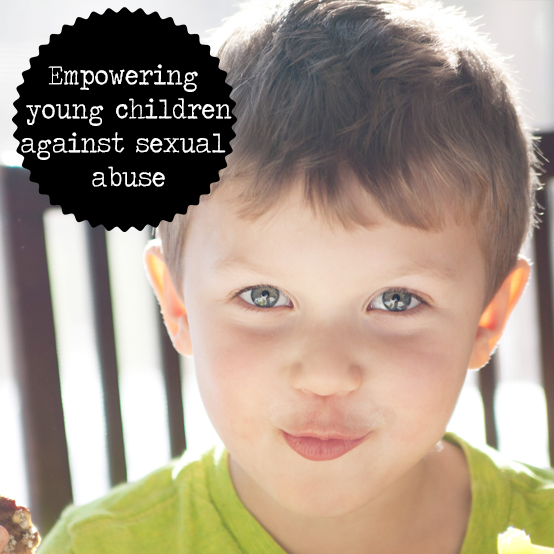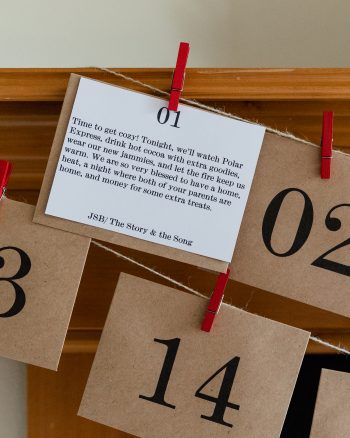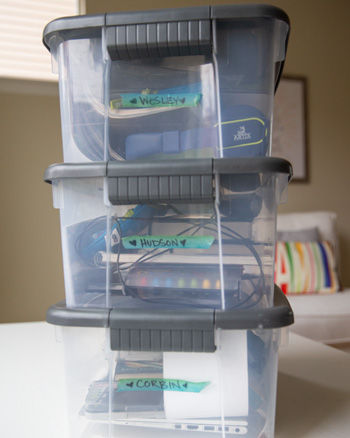This is not going to be the most feel-good post. It’s not the most feel-good topic. However, I feel like it’s a topic that I need to address and it’s a topic that needs to be talked about, openly and honestly, no matter how uncomfortable it is for us. So, for today, for just this one post with a more serious tone, hang with me and maybe you’ll read something that you could be helpful to you.
I’m passionate about protecting children. Although not something I write about often on this blog, it is not a secret that I was not protected as a child. Like many other survivors of childhood trauma, it sparked a fire inside of me to help other children. Becoming a parent made me realize how much I can do to protect my own children and it is so important to me to empower other parents as well. So humor me for a few minutes while I speak to you as an adult who survived a childhood of sexual abuse and as a parent who has vowed to protect and empower my own children and hopefully encourage a few other parents to do the same.
I tell my children that two of my jobs as a mom are to keep them safe and happy. Of course, we all know that our job is much deeper than that but I started saying it when my five year old was around three. Safe and happy are words three year olds understand. I remind my kiddos of my job whenever they get upset about a safety issue that they just feel is unfair like wanting to cross the road on their bikes before I get to the intersection or wanting to swim in the lake as a thunderstorm approaches. Reminding them that one of my jobs is to keep them safe seems to squelch any whining about it. So far it’s worked like a charm. I’m not naïve enough to think it will always be this way, but for now I’m running with it.
As parents (or aunties or uncles or grandparents or caregivers or anyone who is influencing a child’s growth and development), it is our job to protect our kids. Here’s the not-so-fun reality. We can’t protect them from everything or everyone. There are certain things like the feelings of failure or embarrassment that hurt our hearts to see our kids go through. We will be there to support them and help them process but we can’t protect them from those emotions. We also, unless we choose to be with our children at all moments or keep them in a bubble, cannot guarantee that someone will not hurt or try to hurt them. At some point our kids will not be with us for nearly 100% of the time. There’s school and sports and birthday parties and at some point they will be under someone else’s care.
Just trying to prevent sexual abuse isn’t enough because it fails for 1 in 4 girls and 1 in 6 boys. The statistics are staggering and if this were a disease we’d be at epidemic proportions. It can be scary. Terrifying actually, to think of the children you know and apply those statistics. As a survivor I had to decide what to do with that reality. For me, the best thing I could do was to educate myself on how to empower my children. I had to recognize that I could do everything in my power to keep them safe but I also needed to start planting seeds that would help if prevention failed. The only thing worse than your child being abused is your child being abused again because they are scared, ashamed, or confused about what happened and what they should do about it.
Below are the strategies we have used in our home and most importantly why we do them.
1. Children are entitled to their own personal space. Children should have the right to sleep, toilet, bathe, and dress privately. Of course, safety comes first and you are the decider of when a child is capable of bathing and toileting on their own. If a child asks for privacy during these activities, give them as much as possible while still maintaining a safe environment.
2. Personal space also means choosing who they kiss and hug. I’m sure we’ve all been guilty of telling our child to go give Grandma a hug or a kiss. Children should have the final decision in who they decide to be affectionate with. It’s tricky, I know. You don’t want Grandma to feel bad and you know they are a safe person, but ultimately, you’re trying to teach your child that they are in control of their body. Explain to family members that letting the child make the decision keeps them safe because they begin to realize that they don’t have to do what adults what them to do if it makes them uncomfortable.
3. Teach proper names for body parts. I have followed this rule from the beginning with my kids. Trust me; it was not easy for me to have that first conversation about a vagina with my son. I tried to dance around the issue when he asked me if I had a penis. I just told him I didn’t but he would NOT let it go so finally I had to tell him what I had. Oh, the awkwardness. Here’s the thing, there are actually several reasons for this suggestion. One is that just as kids learn rules about their other body parts (for instance, we don’t hit with our hands or we don’t pick our nose or we keep our mouths closed when we eat) we also have rules for penises and vaginas. No one touches them unless it’s to keep us safe or clean. This is a pretty broad rule and you can tailor it to fit your needs.
Another reason for this is because pedophiles use all kinds of cutesy names for these body parts to make abuse seem like a game. Ultimately, if your child knows the correct names and they are talked about in a matter-of-fact way, they will be more likely to come to you if something inappropriate has happened. They will also be able to say NO to the abuser because they know the rules for that body part.
4. Surprises are great! Secrets are not. Teach your child the difference between a secret and a surprise. “A surprise is something that is going to happen and that is going to be happy. A secret is something that is never told and a lot of times it may make you feel sad or yucky in your tummy or heart.” Secrets should never be kept about their bodies. Reassure them that you will always do whatever you can to make them have a happy heart. Let them know if something is making them feel bad, it’s your job as a parent (or caregiver or family member) to make them feel better and that you always want to know if something is making them upset. If your child feels secure in the fact that you won’t blame them and that you will always make a decision that protects and keeps them happy, they will be more likely to confide with you if something has happened.
5. Be honest and matter of fact. When talking about private parts, touching, sex, and personal safety, even if you are totally freaked out, remain calm and be honest. It does not mean you need to tell your 3 year old exactly how his brother got in Mommy’s tummy. It does mean you should tell them what will satisfy their curiosity, at an age appropriate level and most importantly, honestly. Oh, yes, it can be uncomfortable. It can make you want to crawl inside yourself, but once you start doing it you’ll be amazed at how easy it becomes.
6. Use the words “safe and unsafe touches”. If you’re a product of the 80’s like I am, you’ve heard of good touch/bad touch. We heard about it at school and it was a ridiculously uncomfortable lesson. Here’s the thing, we should already be talking to kids before they enter school about appropriate and inappropriate touches. Most children equate good touches with touches that feel good and bad touches with touches that hurt. Abuse does not always hurt. Children can be very confused at the fact that physically it feels good but emotionally and mentally, it is making them feel horrible and full of shame.Teaching children what safe and unsafe touches are helps eradicate this confusion for the child.
I’m learning as I go, of course, and just recently had a more in-depth talk with my five year old. All children are different and I don’t know that my youngest will be ready for this same talk at the same age but I know my oldest is. He’s the one that didn’t want to get out of the lake when a thunderstorm warning was issued. The lifeguards told everyone to exit the lake. “But it’s not even raining,why?? Why? Why?” yells the three year old. “Because my job is to keep you safe and it’s not safe to swim in the lake during a thunderstorm.” This persists for a few more minutes while I try to quickly pack up two young children and all of our belongings. It wasn’t until I got down, looked him in the eye and said, “Corbin, when it thunderstorms there is usually lightening. If you are in the water and lightening comes, you will start on fire.” He looked satisfied with that answer and started to help me pack up. It’s one example of my extremely matter-of-fact child. I have so many examples that sometimes I think I should write a book!
Here were the highlights of our impromptu conversation from last night. It came up when he was talking about bad guys. We were snuggled on the couch just chatting as if we were talking about his day. It’s important that these conversations not be “the talk” and that they be ongoing and comfortable for your child. If you are anxious about it, your child feeds off of your anxiety. Since we’ve laid a strong foundation, it’s not uncomfortable anymore. It’s just another conversation that we have when it comes up.
1. “Your body is yours and no one else can touch you if you don’t want them to.”
2. “You can always say “no” if someone is doing something or touching you in a way you don’t like.”
3. “If someone touches you in way you don’t like you need to tell an adult right away. If that adult doesn’t keep you safe, you keep telling adults until someone does something to get you safe.”
4. “Some people like to trick kids”. (we then talked about what that might look like) “Some people who like to trick kids, look like nice people and maybe you already know them a little bit.” This is the hardest for me to actually say. 80-90% of children are abused by people they know. My abuse was within the family so I know I have to talk about that “bad guys” aren’t all scary looking and they aren’t all mean, but it still sucks to say.
5. “If you think someone is trying to trick you or take you, you should run away or lay down on the ground and scream, punch, kick, yell ‘help!’.”
6. “A grown-up will never ask a kid for help.” I understand that we do ask our kids for help but we talked about what it would look like if a grownup was at a park and asked for help because he was lost. My uber-logical child recognized this was ridiculous and that an adult would ask another adult for help. For now, I feel like it’s a good general rule.
7. “It is not safe to go with someone who says they will give you ice cream/candy or want you to come look at something (like a puppy). You always ask the adult you are with for permission.”
8. “If you get lost, find a mom with kids and tell her you’re lost.” I know it’s stereotypical, but I think it’s a pretty logically sound rule.
9.”You do not have to touch anyone else’s body even if they tell you to. If someone makes you do that, you tell an adult right away and keep telling until you are safe.”
10. We ended the conversation by talking about that he didn’t need to talk to his friends (or little brother) about what we talked about. I said it wasn’t a secret because their parents would talk about it with them when they had time. I reminded him that it was his friends’ parents’ job to talk with them.
Let me reiterate that not every child is the same. Some children might be terrified by that conversation. This particular child is not. Again, we all know our children and their personalities and what works for me, may not work for you. However, at some point, sooner rather than later, the important points in the conversation I had with my child should be talked about. I am confident knowing that because of the openness we have about discussing not-so-fun stuff, my child will feel comfortable coming to me with questions or if something inappropriate ever did happen.
So there’s my yearly stand-on-my-soapbox moment. Stay tuned next week as we start crossing things off our summer bucket list!




This is very well written, Jennifer, and I applaud you for discussing sexual abuse and your personal experiences. I worked as an LCSW serving primarily children affected by sexual abuse and their families–this should be required reading by every human being. We discussed touching in the context of body safety rules which seemed to really have resonance with younger children. Thanks again.
Thanks Kelly! I’m sure you were a fantastic support system for those families. I don’t want to be a downer by posting about this periodically but keeping quiet doesn’t help anyone. Thanks for stopping by!